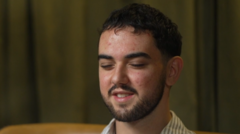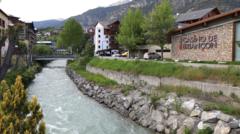Calum Macdonald shares his story of survival after a mass methanol poisoning incident that led to serious consequences for him and his friends.
**Blindness and Tragedy: Survivor's Harrowing Account of Methanol Poisoning in Laos**

**Blindness and Tragedy: Survivor's Harrowing Account of Methanol Poisoning in Laos**
A young man's life forever altered, as he becomes a vocal advocate against the dangers of methanol in Southeast Asia.
Calum Macdonald’s journey took a devastating turn after a holiday in Laos where he fell victim to a tragic case of methanol poisoning. Arriving at the Vietnamese border, Calum was alarmed to realize he could see only a blinding light, leaving him unable to read any documents. Just a day earlier, he and his friends were enjoying complimentary shots of whisky and vodka at a hostel in Vang Vieng.
Initially attributing his odd vision to what they believed to be food poisoning, reality set in when they arrived at their hotel in Vietnam. Calum and his friends were shocked to discover the lights were actually on, yet he couldn’t perceive them. This revelation coincided with a serious poisoning event that left six others dead, two of whom were Danish girls he had met during his stay.
Now blind at 23, Calum recounts this ordeal for the first time, shedding light on the broader issue of methanol poisoning in Southeast Asia, often linked to poorly made alcoholic beverages. He has become an advocate for increased awareness and better travel policy communications from the Foreign Office.
Tragically, Simone White, another victim who drank similar free shots shortly after Calum's departure, fell into a coma and later died from the same poisoning condition. Her mother, Sue White, shares the indescribable pain of losing her daughter, who tragically texted moments before her death that she was having the best holiday ever.
Methanol, commonly found in industrial products, poses a severe risk when mistakenly consumed in alcoholic drinks. Symptoms typically mirror those of a hangover, making it hard to identify acute poisoning until it's too late, often resulting in dire health consequences including blindness and death.
The stories of others like Kirsty McKie, who succumbed in Bali without knowing contaminated alcohol was the cause, and Cheznye Emmons, who died after drinking gin contaminated with an extreme level of methanol, emphasize the severe nature of this public health threat in the region.
Calum now advises travelers to avoid free drinks, suggesting that safer choices include local beers instead of spirits. He reflects humbly on his survival, emphasizing a newfound responsibility to raise awareness and prevent other tragedies.
The UK’s Foreign Office has responded to the growing concerns, acknowledging the need to tackle the issue of methanol poisoning and counterfeit alcohol in popular tourist destinations, and promoting travel safety through awareness campaigns designed to protect vulnerable travelers.
Initially attributing his odd vision to what they believed to be food poisoning, reality set in when they arrived at their hotel in Vietnam. Calum and his friends were shocked to discover the lights were actually on, yet he couldn’t perceive them. This revelation coincided with a serious poisoning event that left six others dead, two of whom were Danish girls he had met during his stay.
Now blind at 23, Calum recounts this ordeal for the first time, shedding light on the broader issue of methanol poisoning in Southeast Asia, often linked to poorly made alcoholic beverages. He has become an advocate for increased awareness and better travel policy communications from the Foreign Office.
Tragically, Simone White, another victim who drank similar free shots shortly after Calum's departure, fell into a coma and later died from the same poisoning condition. Her mother, Sue White, shares the indescribable pain of losing her daughter, who tragically texted moments before her death that she was having the best holiday ever.
Methanol, commonly found in industrial products, poses a severe risk when mistakenly consumed in alcoholic drinks. Symptoms typically mirror those of a hangover, making it hard to identify acute poisoning until it's too late, often resulting in dire health consequences including blindness and death.
The stories of others like Kirsty McKie, who succumbed in Bali without knowing contaminated alcohol was the cause, and Cheznye Emmons, who died after drinking gin contaminated with an extreme level of methanol, emphasize the severe nature of this public health threat in the region.
Calum now advises travelers to avoid free drinks, suggesting that safer choices include local beers instead of spirits. He reflects humbly on his survival, emphasizing a newfound responsibility to raise awareness and prevent other tragedies.
The UK’s Foreign Office has responded to the growing concerns, acknowledging the need to tackle the issue of methanol poisoning and counterfeit alcohol in popular tourist destinations, and promoting travel safety through awareness campaigns designed to protect vulnerable travelers.
















